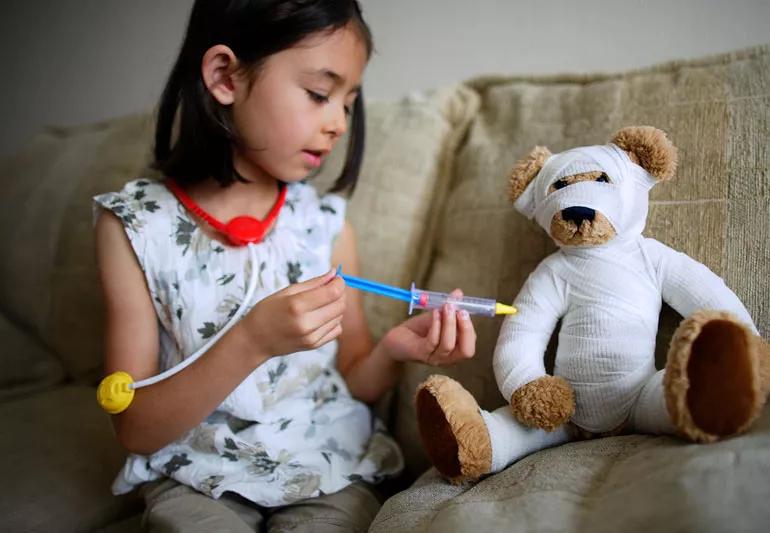Learn how to handle your child’s make-believe pals

Image content: This image is available to view online.
View image online (https://assets.clevelandclinic.org/transform/ea414706-dcb0-445b-9d87-9340e2183d93/childStuffedToy-105969161_770x533_jpg)
young girl playing with her stuffed animal
Parents want their children to have good friends. But what if that friend exists only in your child’s mind?
Advertisement
Cleveland Clinic is a non-profit academic medical center. Advertising on our site helps support our mission. We do not endorse non-Cleveland Clinic products or services. Policy
Clinical psychologist Kate Eshleman, PsyD, cares for children and adolescents. She has some reassuring news about imaginary friends — and what you should do if your child has conjured up a companion.
As a child, having an imaginary friend is normal. And not having an imaginary friend? Also normal. “A little over half of all children have an imaginary friend or playmate at some point,” says Dr. Eshleman. “But if they don’t have one, that’s fine too. It depends on the child.”
You might assume that only very young children have imaginary friends, but research has shown that older kids have imaginary pals, too. “It’s common with children up to age 12,” says Dr. Eshleman.
Imaginary friends can be figments of your child’s imagination. Or the friend might be a stuffed animal or toy that they role-play with. Either way, it’s a normal part of childhood for many kids.
Little Emma talks to her stuffed bear regularly. Does that mean she’s feeling stressed or alone?
Dr. Eshleman says not to worry. “Children might use an imaginary friend to replay or work through things they experience in life,” she explains. “It’s a way to help them practice social skills and process things they see. It doesn’t mean anything is wrong with your child.”
Advertisement
It might feel awkward when your child discusses their imaginary friend with you. But Dr. Eshleman says it’s good for parents to play along.
“Treat your child’s imaginary friend like any other friend,” advises Dr. Eshleman. “Ask your child what their friend’s name is. Or talk to them about what they did with their friend today.”
Maybe your child wants their imaginary friend to have a place at the dinner table. This is OK, too, but you don’t have to take it to extremes. “Don’t give the imaginary friend the last portion of food that someone else would eat,” Dr. Eshleman says. “But if it’s not hurting anyone else, it’s perfectly fine to allow their friend to have a place at dinner.”
If your child is especially creative, their interactions with their imaginary friend can be quite convincing. How can you be sure your child still understands reality?
“The evidence suggests that kids know their imaginary friends aren’t real,” Dr. Eshleman says. “They may talk about them as if they’re real, but they’re aware that it’s make-believe.”
But to be safe, talk to your pediatrician if your child:
A quick check-in with your pediatrician can put your mind at ease. “Remember that you’ll see some behavior changes as your child grows, and this is normal,” says Dr. Eshleman. “But if you’re not sure, it never hurts to ask.”
If your child has an imaginary friend, you can reap the benefits, too. After all, an imaginary friend is an awesome listener who’s always available to your child.
“When you’re busy with other tasks, your child can chat with their imaginary friend,” says Dr. Eshleman. “It can keep a child occupied, and that helps the parents out, too. And studies have shown that children who have imaginary friends often grow up to be highly creative adults.”
Advertisement

Sign up for our Health Essentials emails for expert guidance on nutrition, fitness, sleep, skin care and more.
Learn more about our editorial process.
Advertisement
Participating in sports teaches kids life skills and can build self-confidence for the long haul
Learning new strategies to meet the challenges of growing up
Coronavirus coping skills for kids
Finding a balance between work + play
Study finds childhood mental health disorders are common, but largely untreated
It’s never too early to teach your kids who strangers are and how to avoid unsafe situations
Too much screen time and unrealistic expectations and perceptions and can lead to an increased risk of anxiety and depression
For starters, pick the right size backpack for your child, with wide, padded straps
Type 2 diabetes isn’t inevitable with these dietary changes
Applying a hot or cold compress can help with pain
Pump up your iron intake with foods like tuna, tofu and turkey